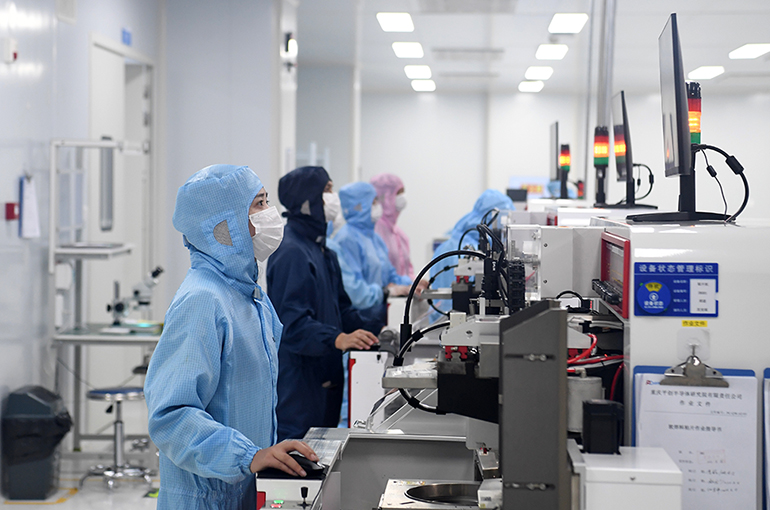 China Probe on US Analog Chips Could Unlock USD350 Million Market for Local Firms
China Probe on US Analog Chips Could Unlock USD350 Million Market for Local Firms(Yicai) Sept. 16 -- China’s anti-dumping investigation into US-made analog chips could create a domestic market opportunity worth about CNY2.5 billion (USD350 million) for Chinese manufacturers, though structural challenges remain.
The Ministry of Commerce on Sept. 13 launched the probe to determine whether US suppliers sold analog chips at unfairly low prices in China. These chips are widely used in microphones, laptops, and mobile phones.
The move may restrict the market presence of US leaders such as Texas Instruments and Analog Devices, creating room for local players, market participants said.
Shares of Chinese analog chip firms retreated today after surging the previous day. SG Micro [SHE: 300661] closed 4.7 percent lower at CNY83.28 (USD11.17) after jumping 20 percent yesterday, while Belling [SHA: 600171] fell 3 percent to CNY37.33 after a 10 percent gain.
China is the world’s largest single market for analog chips, and demand continues to expand with the growth of new energy vehicles, artificial intelligence, and robotics. The global analog chip market is projected to reach USD84 billion this year, with China accounting for over half at more than CNY350 billion (USD49.2 billion), according to the Zhongyan Puhua Industry Research Institute.
A Soochow Securities report noted that China’s analog chip demand reached 3.5 billion units last year, with domestic firms supplying only a third. US suppliers accounted for 68 percent of imports. At an average unit price of CNY1.6 (22 US cents), the value of chips potentially subject to anti-dumping duties is about CNY2.51 billion.
Executives at local companies cautioned that the investigation will not significantly affect their operations in the short term. A representative from SG Micro’s securities department told Yicai that the probe has little impact on its performance or research activities.
“Since the beginning of this year, downstream demand across our product lines has shown moderate recovery. Revenue changes in individual products have a limited effect on overall results,” the company insider said. SG Micro’s portfolio covers the signal chain and power management sectors, with applications in industrial control, automotive, communications, medical, and consumer electronics.
A Belling representative said the probe could help increase local market share, noting that Belling also focuses on signal chain and power management products, mainly for domestic customers.
Market Potential and Hurdles
Industry analysts said the investigation may create opportunities but also underline persistent challenges for Chinese chipmakers.
Although domestic analog chip sales and competitiveness have improved in recent years, profit margins have narrowed amid fierce competition. Most local firms remain concentrated in mid-to-low-end products, while breakthroughs in high-end technology are still lacking. Long certification cycles in the automotive and industrial sectors also limit substitution potential.
Texas Instruments dominates the global market with over 100,000 products, particularly in signal chain and power management. By comparison, SG Micro offered 5,900 products as of last year, while Belling had around 4,560, according to company filings.
Analog chips are indispensable, an analyst told Yicai. Unlike digital chips, their unit prices are low, and they cover a vast array of types. Development is focused not on miniaturization but on enhancing performance, bandwidth, and efficiency. High-end products demand deep expertise and highly skilled engineers, who are scarce in China, the analyst added.
Switching suppliers is also difficult due to high sunk costs, strong brand loyalty, and the “one-stop” product portfolios offered by global leaders. The analyst noted that top US firms typically operate as integrated device manufacturers, handling design, production, packaging, and testing in-house to better control technology and costs. In contrast, Chinese firms mostly follow a fabless model, outsourcing manufacturing to foundries.
Customers in automotive and industrial markets impose strict requirements for reliability, consistency, and lifespan. Even if policy support opens testing opportunities, large-scale substitution will only occur if domestic chips match or exceed imported products in performance, power efficiency, and stability while providing comparable technical support, the analyst said.
Editor: Emmi Laine